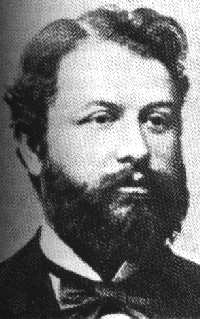Georg Jellinek
Georg Jellinek | |
|---|---|
 Georg Jellinek | |
| Born | 16 June 1851 |
| Died | 12 January 1911 (aged 59) |
| Occupation | Jurist |
Georg Jellinek (16 June 1851 – 12 January 1911) was a German public lawyer and was considered to be "the exponent of public law in Austria“.[1]
Life
Jellinek was born in Leipzig.[2] His father, Adolp Jellinek, was an Austrian rabbi.[2]
From 1867, Jellinek studied law, history of art and philosophy at the University of Vienna. He also studied philosophy, history and law in Heidelberg and Leipzig up until 1872. He was the son of Adolf Jellinek, a famous preacher in Vienna's Jewish community. In 1872 he completed his Dr. phil. thesis in Leipzig (The Socio-Ethical Meaning of Justice, Injustice and Punishment) and in 1874 also his Dr. jur. in Vienna.
In 1879 he qualified as a professor at the University of
He was married to
Jellinek is best known for his essay The Declaration of the Rights of Man and the Citizen (1895), which argues for a universal theory of rights, as opposed to the culturally and nationally specific arguments then in vogue (particularly that of
Career

Jellinek studied law in 1867 at the
In 1879 Jellinek received his
Writings
The majority of Jellinek's writings remains yet untranslated from the German original.
- Die Weltanschauungen Leibnitz’ und Schopenhauer’s: Ihre Gründe und ihre Berechtigung. Eine Studie über Optimismus und Pessimismus. Vienna: Hölder, 1872 (digital copy).
- Die Lehre von den Staatenverbindungen. Haering, Berlin 1882 (digital copy).
- Die socialethische Bedeutung von Recht, Unrecht und Strafe. Vienna: Hölder, 1878 (digital copy).
- Die rechtliche Natur der Staatenverträge: Ein Beitrag zur juristischen Construction des Völkerrechts. Vienna: Hölder, 1880 (digital copy).
- Österreich-Ungarn und Rumänien in der Donaufrage: Eine völkerrechtliche Untersuchung. Vienna: Hölder, 1884 (digital copy).
- Gesetz und Verordnung: Staatsrechtliche Untersuchungen auf rechtsgeschichtlicher und rechtsvergleichender Grundlage. Freiburg im Breisgau: Mohr, 1887 (digital copy).
- System der subjektiven öffentlichen Rechte. Freiburg im Breisgau: Mohr, 1892 (digital copy).
- Allgemeine Staatslehre (= Recht des modernen Staates. Vol. 1). Berlin, 1900; 2nd edition 1905 (digital copy); 3rd edition 1914 (digital copy).
Literature
- Andreas Anter (Hrsg.): Die normative Kraft des Faktischen: das Staatsverständnis Georg Jellineks. Nomos-Verlag, Baden-Baden 2004, ISBN 3-8329-0733-5.
- Alexander Hollerbach (1974), "Jellinek, Georg", Neue Deutsche Biographie (in German), vol. 10, Berlin: Duncker & Humblot, pp. 391–392; (full text online)
- Camilla Jellinek: Georg Jellinek. Ein Lebensbild. In: Georg Jellinek, Ausgewählte Schriften und Reden, Bd. 1, Neudruck Aalen 1970, S. 5–140.
- Christian Keller: Victor Ehrenberg und Georg Jellinek. Briefwechsel 1872–1911, Frankfurt am Main 2005, ISBN 978-3-465-03406-3.
- Klaus Kempter: Die Jellineks 1820–1955. Eine familienbiographische Studie zum deutschjüdischen Bildungsbürgertum. Düsseldorf 1998.
- Jens Kersten: Georg Jellinek und die klassische Staatslehre. Verlag Mohr-Siebeck, Tübingen 2000, ISBN 3-16-147348-5.
- Realino Marra: La religione dei diritti. Durkheim – Jellinek – Weber. Giappichelli, Turin 2006, ISBN 88-348-6617-7.
- Stanley L. Paulson (Hrsg.): Georg Jellinek: Beiträge zu Leben und Werk. Verlag Mohr-Siebeck, Tübingen 2000, ISBN 3-16-147377-9.
References
- ISBN 3-16-147377-9.
- ^ ISSN 0002-9300.
Further reading
- Kelly, Duncan (2004). "Revisiting the Rights of Man: Georg Jellinek on Rights and the State". Law and History Review. 22 (3). American Society for Legal History: 493–529. S2CID 145078468.
External links
- Works by Georg Jellinek at Project Gutenberg
- Works by or about Georg Jellinek at Internet Archive
- Literature by and about Georg Jellinek in the German National Library catalogue
- Familienpapiere Jellinek 1850–1960 (Archived 2016-03-03 at the Wayback Machine)
- Matthias Hartwig: Der Staat als Gegenstand des Staatsrechts
- Jens Kersten: Georg Jellinek
